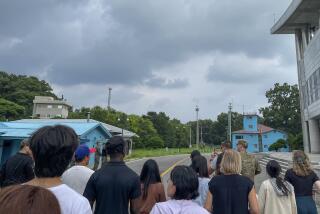Talks to Reunite Korean Families Hit a Snag
- Share via
SEOUL — Red Cross talks between North and South Korea to reunite families separated by the Korean War stumbled from the beginning Tuesday because of disagreements over repatriating Communist spies held in the South.
Red Cross officials of the Korean nations began a four-day session at a hotel on Mt. Kumgang, a sightseeing attraction on the North’s east coast. A key agenda item was how to reunite families separated by the war half a century ago.
But the talks adjourned in 80 minutes and will not resume until Thursday as North Korea insisted that the South repatriate convicted North Korean spies before reunions of separated families take place.
At their first summit two weeks ago, the two Koreas agreed to allow an unspecified number of separated family members to visit their hometowns in mid-August in what the South hopes to be the first of a series of reunions.
South Korea said that, once the first reunion takes place, it will return an unspecified number of Communist spies to the North.
During Tuesday’s discussions, however, North Korea proposed that South Korea repatriate Communist spies in early August. Then each side could allow 100 separated family members to cross the border for temporary reunions in mid-August, said the North’s official Korean Central News Agency.
South Korean human rights groups say 88 convicted Northern spies are in the South. Of those, 58 people with families in North Korea want to go home.
Another stumbling block at Tuesday’s talks was North Korea’s refusal to allow a reporter from South Korea’s Chosun Ilbo newspaper, which has been critical of the Communist regime, to enter the country. The Chosun reporter was one of the six South Korean reporters who traveled with South Korean Red Cross officials.
In the first reunion in 1985, 50 separated family members from each nation were allowed to cross the border. Efforts to arrange further family reunions failed because of political and military tensions.
About 1.2 million people fled what is now North Korea during the 1950-53 Korean War to settle in South Korea, Seoul officials said.
Also on Tuesday, a U.S. delegation departed for North Korea to search for the remains of soldiers missing in action since the Korean War, a U.S. military official said.
The search team left in a C-17 military transport plane from Yokota air base in western Tokyo, said Col. Jeanette Minnich with U.S. Forces Japan. The contingent of 20 American investigators will search for remains in two counties north of Pyongyang, North Korea’s capital.
It is the first of five excavations scheduled for this year, the Pentagon said in a statement Monday. Each operation, conducted jointly with North Korean officials, will last about a month.
Since 1996, U.S. investigators have conducted 12 search operations and recovered 42 sets of remains under an agreement that allows for joint recovery missions, the Pentagon said. Before that, the U.S. had no way to recover remains north of the demilitarized zone.
So far, five sets of remains have been identified by the Army. On Monday, the Pentagon announced the names of two of the long-missing soldiers: Army Sgts. Hallie Clark Jr. of Hannibal, Mo., and James Higgins of Bellam, Ky. They were among the estimated 37,000 U.S. soldiers killed during the war.
More to Read
Sign up for Essential California
The most important California stories and recommendations in your inbox every morning.
You may occasionally receive promotional content from the Los Angeles Times.













